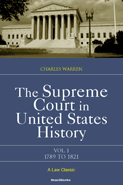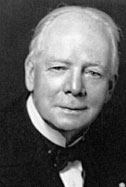
|
The Supreme Court in United States History
By Charles Warren
1999/09 - Beard Books - Law Classic
Volume I (1789-1821) - 560 pp.
1893122182 - Paperback
- Reprint
US$34.95 |
Volume II (1821-1855) - 566 pp.
1893122190 - Paperback - Reprint
US$34.95
|
Volume III (1856-1918) - 546 pp.
1893122204 - Paperback - Reprint
US$34.95
|
|

|
A term-by-term exposition of the Court and its major decisions are explored as factors in the course of history.
Publisher Comments
Lawyers, historians, and laymen will enjoy reading this exposition of the Court
and its decisions as living elements and important factors in the course of the
history of the United States. The Court is described term-by-term so that its
decisions can be correlated to political events. Views of important cases by
then contemporary writers and statesmen are stressed to set the impression made
on the public which, according to the author, often has had as great an effect
on history as the decisions themselves. The important role that public opinion
attacks upon the Court have played is emphasized.

No book review available

Charles Warren was born in Boston, Massachusetts on March 9, 1869 to Hon.
Winslow and Mary Lincoln. He received his A.B. from Harvard University in
1889, and his LL.D from Columbia University in 1933. He was admitted to
bar in 1892 and practiced at Boston. He became a private secretary to Gov.
William E. Russell in 1893; Associate in Gov. Russell's law practice until
Russell's death in 1896. He then became a senior member of Warren and
Perry, Boston (1897-1914); chairman of the Civil Service Commission (1905-11);
assistant attorney general of the United States, Washington (1914-18). He
was appointed special master by U.S. Supreme Court in case of New Mexico vs.
Texas in 1924, and a lot of such cases. Academically, he was Stafford
Little lecturer in Princeton (1924), University of Rochester Cutler lecturer on
Constitution (1927), Boston University Law School Bacon Lecturer on Constitution
(1928); James Schouler lecturer on history, John Hopkins (1928);
William H. White lecturer on jurisprudence, University of Virginia (1932); Julius
Rosenthal Foundation lecturer on law, Northwestern University Law School (1934);
Norman Wilt Harris lecturer on neutrality, University of Chicago (1936); Frank Irvine
lecturer, Cornell University (1937); Cutler lecturer on Constitution, College of William
and Mary (1940).
Gov.
William E. Russell in 1893; Associate in Gov. Russell's law practice until
Russell's death in 1896. He then became a senior member of Warren and
Perry, Boston (1897-1914); chairman of the Civil Service Commission (1905-11);
assistant attorney general of the United States, Washington (1914-18). He
was appointed special master by U.S. Supreme Court in case of New Mexico vs.
Texas in 1924, and a lot of such cases. Academically, he was Stafford
Little lecturer in Princeton (1924), University of Rochester Cutler lecturer on
Constitution (1927), Boston University Law School Bacon Lecturer on Constitution
(1928); James Schouler lecturer on history, John Hopkins (1928);
William H. White lecturer on jurisprudence, University of Virginia (1932); Julius
Rosenthal Foundation lecturer on law, Northwestern University Law School (1934);
Norman Wilt Harris lecturer on neutrality, University of Chicago (1936); Frank Irvine
lecturer, Cornell University (1937); Cutler lecturer on Constitution, College of William
and Mary (1940).
He was appointed by President Roosevelt as American member of the. Trail Smelter
Arbitral Tribunal, 1937 (final decision filed 1941) and other similar positions.
He was an officer and member of several organization ( Board of Overseers, Harvard
College, Harvard Alumni Association, Conservatory of Music, Massachusetts
Historical Society, American Society on International Law, National Institute of
Arts and Letters, American Academy of Arts and Letters, American Philosophical
Society).
He was the author of several books including History of the American
Bar, The Supreme Court in United States
History (3 vols.), 1922; and Bankruptcy in United States History, 1935.
He died August 16, 1954.
 Other Beard Books by
Charles Warren Other Beard Books by
Charles Warren

|
Volume I |
|
Preface |
v |
|
Abbreviations of Titles of Books Frequently Cited |
xv |
|
Introductory Chapter |
1 |
|
Chapter I. |
The First Courts and the Circuits |
31 |
|
Chapter II. |
State Sovereignty and Neutrality |
91 |
|
Chapter III. |
Chief Justices Rutledge and Ellsworth |
124 |
|
Chapter IV. |
Marshall, Jefferson and the Judiciary |
169 |
|
Chapter V. |
The Mandamus Case |
231 |
| Chapter VI. |
Impeachment and Treason |
269 |
| Chapter VII. |
Judge Johnson and the Embargo |
316 |
| Chapter VIII. |
Pennsylvania and Georgia Against the Court |
366 |
| Chapter IX. |
Judge Story, the War and Federal Supremacy |
400 |
| Chapter X. |
The Judges and the Court-rooms |
454 |
| Chapter XI. |
Corporate Charters and Bankruptcy |
474 |
| Chapter XII. |
The Bank of the United States |
499 |
|
Volume III |
|
Abbreviations of Titles of Books Frequently Cited |
ix |
|
Chapter XIII. |
Virginia Against the Court |
1 |
|
Chapter XIV. |
International Law |
25 |
|
Chapter XV. |
The Steamboat Monopoly Case |
47 |
| Chapter XVI. |
Kentucky Against the Court |
93 |
| Chapter XVII. |
Judiciary Reform |
112 |
| Chapter XVIII. |
Constitutional Law and Daniel Webster |
146 |
| Chapter XIX. |
The Cherokee Cases and President Jackson |
189 |
| Chapter XX. |
The Last Years of Chief Justice Marshall |
240 |
| Chapter XXI. |
Chief Justice Taney and Whig Pessimism |
275 |
| Chapter XXII. |
Corporations and Slavery |
313 |
| Chapter XXIII. |
Federal Powers, Tyler and the Girard Will Case |
357 |
| Chapter XXIV. |
State Powers, Commerce and Boundaries |
408 |
| Chapter XXV. |
Slavery and State Defiance |
480 |
|
Volume II |
|
Abbreviations of Titles of Books Frequently Cited |
ix |
| Chapter XXVI. |
The Dred Scott Case |
1 |
| Chapter XXVII. |
The Booth Case, and Congressional Attacks |
42 |
| Chapter XXVIII. |
Civil War and Chief Justice Chase |
80 |
| Chapter XXIX. |
The Milligan Case |
140 |
| Chapter XXX. |
Reconstruction |
177 |
| Chapter XXXI. |
The Legal Tender Cases |
220 |
| Chapter XXXII. |
The Slaughterhouse Cases and the Death of Chase |
255 |
| Chapter XXXIII. |
Chief Justice Waite and the Fourteenth Amendment |
284 |
| Chapter XXXIV. |
The Civil Rights Acts |
322 |
| Chapter XXXV. |
Increase of Nationalism |
344 |
| Chapter XXXVI. |
Expansion of Judicial Powers |
385 |
| Chapter XXXVII. |
Chief Justices Fuller and White |
413 |
| Chapter XXXVIII. |
Commerce and the Police Power |
451 |
|
Appendix |
|
|
List of Persons Nominated as Chief Justice and as Associate Justice of the Supreme Court of the United States, 1789-1921 |
479 |
|
Index |
485 |
|
